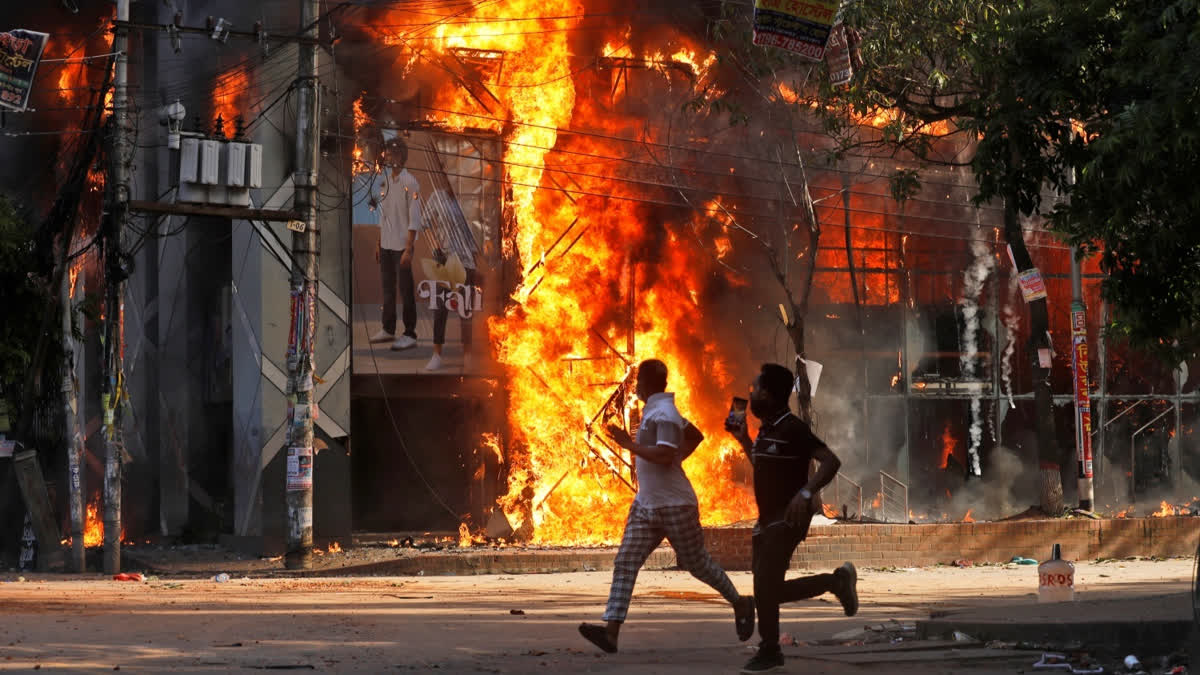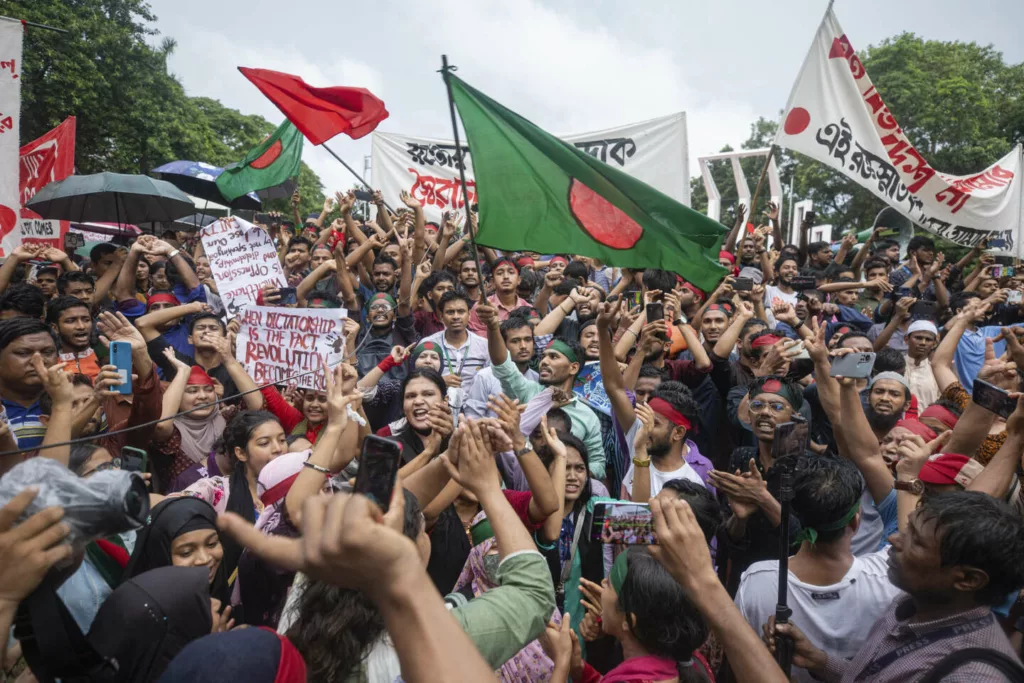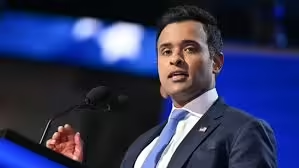Bangladeshi protesters demanding Prime Minister Sheikh Hasina resign are set to return to the streets Monday after one of the deadliest days since anti-government unrest erupted last month. Analysts fear violence could surpass that seen on Sunday, when hundreds of thousands of protesters and government supporters countrywide battled each other with sticks and knives, and security forces opened fire with rifles.

Dhaka: Day after nearly 100 people were killed in violence across the country, Bangladesh braced for another tense day as protestors asked the general public to join a “Long March to Dhaka” on Monday.
Sunday saw fierce clashes between demonstrators demanding Prime Minister Sheikh Hasina’s resignation and the ruling party supporters in different parts of the country. At least 99 people, including 14 policemen, were killed in the clashes, leading Bengali-language newspaper Prothom Alo reported.
The clashes broke out Sunday morning when protesters attending the non-cooperation programme under the banner of the Students Against Discrimination with the one-point demand of Hasina’s resignation over a job quota system faced opposition from the supporters of the ruling Awami League, Chhatra League, and Jubo League activists.
The violence forced authorities to cut off mobile internet and enforce a nationwide curfew for an indefinite period. The Anti-Discrimination Student Movement has rescheduled their “Long March to Dhaka” to be held on Monday, a day earlier than initially planned.
The decision was taken during an urgent meeting amid growing concerns in the country, Asif Mahmud, a coordinator of the movement, said in a press release issued on Sunday night. “In an urgent decision to review the situation, our ‘March to Dhaka’ program has been changed from August 6 to August 5. In other words, we are calling on students from all over the country to travel to Dhaka tomorrow (Monday),” he said.
“The final battle has come. It is time to make the final signature of this student citizen uprising. Come to Dhaka to be a part of history. Students will create a new Bangladesh,” Asif added, asking the general public to join it. The Awami League’s planned mourning procession on Monday has been cancelled due to a curfew. India has advised all its nationals to avoid travelling to Bangladesh until further notice due to ongoing violence.
‘Interim government’
Meanwhile, the University Teachers’ Network has proposed to form an interim government immediately consisting of people of different sections and professions. According to the proposal, Hasina will have to hand over power to the interim government. The teachers’ network held a press conference titled ‘Proposal of an outline for transition to a democratic Bangladesh free of discrimination’ at the Sagar-Runi Auditorium of Dhaka Reporters’ Unity Sunday.
The clashes on Sunday erupted days after over 200 people were killed in violent clashes between the police and mostly student protesters demanding an end to the controversial quota system that reserved 30 per cent of government jobs for relatives of veterans who fought in Bangladesh’s War of Independence in 1971. Since then, more than 11,000 people have been arrested.
Officials claimed that Sunday’s protests were joined by unidentified people and activists of rightwing Islami Shashontantra Andolon, which erected barricades on several major highways and within the capital city. Houses of public representatives, Awami League offices, police stations and other government installations were attacked, vandalised and torched in 39 districts on Sunday.
The situation prompted authorities to order a curfew in major cities and small towns across Bangladesh for an indefinite period from 6 PM Sunday, mobilising troops, paramilitary border guards BGB, and the elite anti-crime Rapid Action Battalion alongside police. The government ordered the shutdown of Meta platforms Facebook, Messenger, WhatsApp and Instagram. The mobile operators were ordered to shut down 4G mobile internet
Prime Minister Hasina on Saturday offered to sit for talks with the coordinators of the movement. However, they rejected her proposal. The government leaders earlier claimed that the peaceful campaign was hijacked by fundamentalist Jamaat-e-Islami and their student front Islami Chhatra Shibir being backed by ex-premier Khaleda Zia’s BNP.
‘Raw anger’
In several cases, soldiers and police did not intervene to stem the protests, unlike during the past month of rallies that repeatedly ended in deadly crackdowns. Demonstrators in Dhaka, surrounded by a tightly packed and cheering crowd, waved a Bangladeshi flag on top of an armoured car as soldiers watched, according to videos on social media Sunday verified by AFP.
“Let’s be clear: The walls are closing in on Hasina: She’s rapidly losing support and legitimacy,” Michael Kugelman, director of the South Asia Institute at the Washington-based Wilson Center, told AFP.

“The protests have taken on immense momentum, fuelled by raw anger but also by the confidence that comes with knowing that so much of the nation is behind them.” In a hugely symbolic rebuke of Hasina, a respected former army chief demanded the government “immediately” withdraw troops and allow protests.
“Those who are responsible for pushing people of this country to a state of such an extreme misery will have to be brought to justice,” ex-army chief General Ikbal Karim Bhuiyan told reporters Sunday, in a joint statement alongside other senior former officers.
‘By the people’
Current army chief Waker-uz-Zaman told officers on Saturday that the military “always stood by the people”, according to an official statement, which gave no further details and did not say explicitly whether the army backed the protests. The anti-government movement has attracted people across society in the South Asian nation of about 170 million people, including film stars, musicians and singers.
Hasina has ruled Bangladesh since 2009 and won her fourth consecutive election in January after a vote without genuine opposition. Her government is accused by rights groups of misusing state institutions to entrench its hold on power and stamp out dissent, including through the extrajudicial killing of opposition activists. Demonstrations began over the reintroduction of a quota scheme that reserved more than half of all government jobs for certain groups. The protests have continued despite the scheme having been scaled back by Bangladesh’s top court. (With PTI and AFP inputs)


